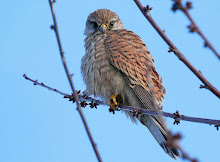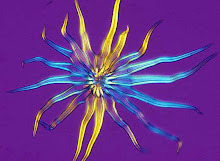All the animals below (except the bottom one) were found in a single jam jar of water, dredged along the edge of our garden pond which had been frozen over on the previous night.
This is a freshwater orb-cockle Sphaerium sp. There must the hundreds of these little bivalves (the largest was about 8mm. across) in our pond. The two pink protruding tubes on the left are the inhalent and exhalent siphons that circulate water over the gills. You can just see the muscular foot protruding through the shell valves in the 5 o'clock position.

Orb-cockles are surprisingly mobile, especially when they are small. This one, whcih was about 4mm. long, is using its muscular foot (which you can see protruding from the back of the shells) to scoot across the bottom of the container.
There are scores of these red ramshorn snails in our pond but it's providing difficult to identify it precisely. I posted the pictures on the excellent iSpot web site and there are varying opinions as to its identify. It might be Planorbis corneus rubrum or it could be Planorbella duryi which is the American ramshorn snail. Either way it's an introduced species that probably came in with pond weed bought from a garden centre.
If there are scores of ramshorn snails, then there must be many thousands of these flatworms (Polycelis nigra?) in our garden pond - there were over 50 in a single jam jar sample. They glide along like magic carpets, propelled by a covering of beating cilia which you can see on a marine species by clicking here.
Our pond has a thick layer of decomposing leaves at the bottom - perfect conditions for water slaters (aka water hog-lice), so there are large numbers present.
The young gammarids are almost transparent - I think this must be a male, judging from those prominent claws on the front pair of legs.
And finally, this animal (below) is not from our pond. I collected it a few days ago from the gravelly bottom of a ditch, with snow melt water flowing over it, on the edge of the moors at St. John's near Wolsingham in Weardale, and it's ........
...... an exquisite little caddisfly larva, with a tube constructed mostly from quartz grit. They can be coaxed to build their tubes from more exotic materials - for a stunning example, click here




































What marvellous creatures to find. I particularly like the Caddis Fly. Your link shows them to very good advantage, I feel.
ReplyDeleteI find caddis larvae fascinating. There's one species that I've never seen but would love to find that makes its case from tiny snail shells.
DeleteGreat images and information, I will come back to this as I am hoping to record some of the things living in the pond at the park during the summer. If it carries on raining the pond might come to me !!!
ReplyDeleteHope you find some good stuff Amanda!
DeleteI am random surfing the blogs and enjoyed this one very much as I am partial to a bit of pond dipping. This has inspired me to give bit a go as soon as the weather permits. I think I shall need a flask of warm water to revive my fingers when I do so!
ReplyDeletehi Andrew, our pond has frozen over now too. I was amazed how much life there is in such icy water! Good luck!
ReplyDelete